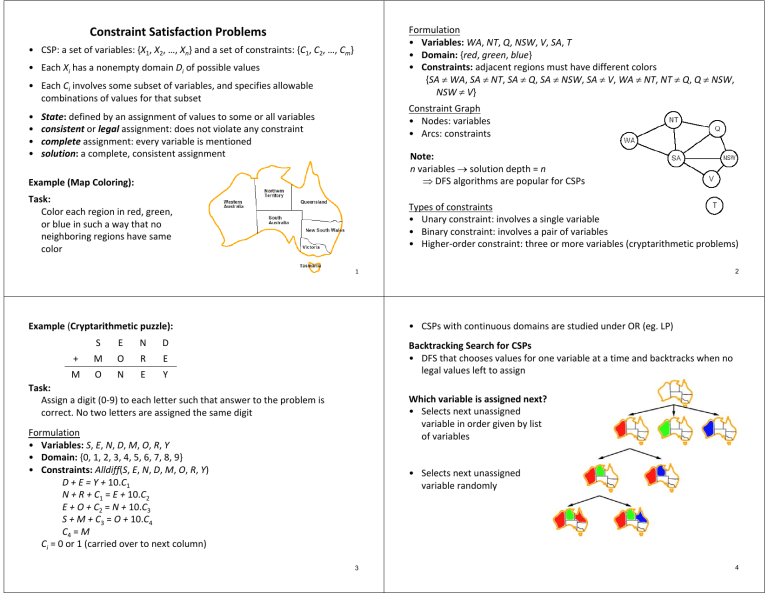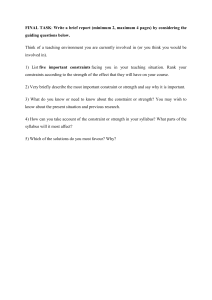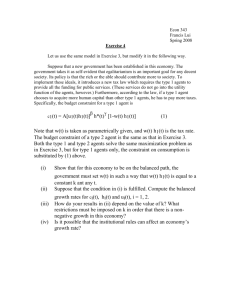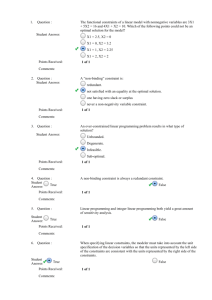
Formulation
• Variables: WA, NT, Q, NSW, V, SA, T
• Domain: {red, green, blue}
• Constraints: adjacent regions must have different colors
{SA WA, SA NT, SA Q, SA NSW, SA V, WA NT, NT Q, Q NSW,
NSW V}
Constraint Satisfaction Problems
• CSP: a set of variables: {X1, X2, …, Xn} and a set of constraints: {C1, C2, …, Cm}
• Each Xi has a nonempty domain Di of possible values
• Each Ci involves some subset of variables, and specifies allowable
combinations of values for that subset
•
•
•
•
Constraint Graph
• Nodes: variables
• Arcs: constraints
State: defined by an assignment of values to some or all variables
consistent or legal assignment: does not violate any constraint
complete assignment: every variable is mentioned
solution: a complete, consistent assignment
Example (Map Coloring):
Note:
n variables solution depth = n
DFS algorithms are popular for CSPs
Task:
Color each region in red, green,
or blue in such a way that no
neighboring regions have same
color
Types of constraints
• Unary constraint: involves a single variable
• Binary constraint: involves a pair of variables
• Higher‐order constraint: three or more variables (cryptarithmetic problems)
2
1
• CSPs with continuous domains are studied under OR (eg. LP)
Example (Cryptarithmetic puzzle):
+
S
E
N
D
M
O
R
E
Backtracking Search for CSPs
• DFS that chooses values for one variable at a time and backtracks when no
legal values left to assign
M O
N
E
Y
Task:
Assign a digit (0‐9) to each letter such that answer to the problem is
correct. No two letters are assigned the same digit
Which variable is assigned next?
• Selects next unassigned
variable in order given by list
of variables
Formulation
• Variables: S, E, N, D, M, O, R, Y
• Domain: {0, 1, 2, 3, 4, 5, 6, 7, 8, 9}
• Constraints: Alldiff(S, E, N, D, M, O, R, Y)
D + E = Y + 10.C1
N + R + C1 = E + 10.C2
E + O + C2 = N + 10.C3
S + M + C3 = O + 10.C4
C4 = M
Ci = 0 or 1 (carried over to next column)
• Selects next unassigned
variable randomly
3
4
•
Most constrained variable (with fewest legal values) [minimum remaining
values (MRV) heuristic]
•
Degree heuristic: variable with most constraints on remaining variables
In what order should its values be tried?
• As specified in the list of values
• Randomly
• Least constraining value: given a variable, choose the value that rules out
fewest choices for the neighboring variables
Variable ordering – reduces search space
Value ordering – attempts to find the first answer quickly
5
7
Forward checking
When variable X is assigned a value, process looks at each variable Y that
is connected to X by a constraint, and deletes from Y’s domain any value
that is inconsistent with value chosen for X
6


